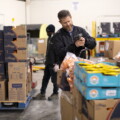Sarah Stern, executive director of the Maple Leaf Centre for Food Security, discussed with editor-at-large Sean Speer, among other topics, the state of food insecurity in Canada, its disproportionate effect on the disabled community, and the role for public policy to lower food insecurity.
Here are three key takeaways from their discussion.
1. Food insecurity is prevalent among those with disabilities
Food insecurity in Canada disproportionately affects people with disabilities. Over 50 percent of food-insecure individuals above age 15 have a disability. The challenge is compounded by higher living costs and limited income potential among people with disabilities, necessitating focused public policy interventions.
2. The Canada Disability Benefit (CDB) needs expansion
While the CDB is a step in the right direction, there is significant public and expert support for a more substantial benefit that could lift Canadians with disabilities above the poverty line. Stern emphasizes the need for easier access to the CDB, collaboration across jurisdictions, and ensuring the benefit integrates well with provincial disability supports to avoid disincentives or reductions in other essential aid.
3. There are broader implications to achieving food security
Reducing food insecurity in Canada by half by 2030 would align with the shared belief in eliminating the barriers to help disabled and other communities that are suffering. This could alleviate strain on the healthcare system, improve educational outcomes for children, and promote economic and social well-being. Achieving this goal requires holistic solutions, addressing not just food access but also underlying issues like housing affordability and intergovernmental collaboration.
ChatGPT assisted in the creation of these takeaways.
This episode was made possible by the Maple Leaf Centre for Food Security and the generosity of listeners like you. Donate today.








